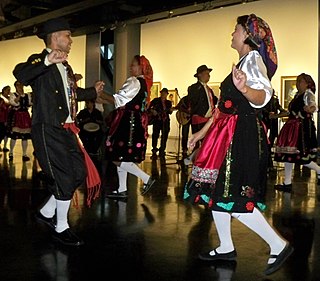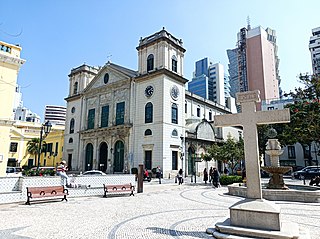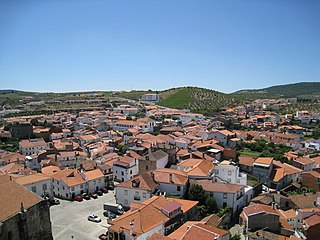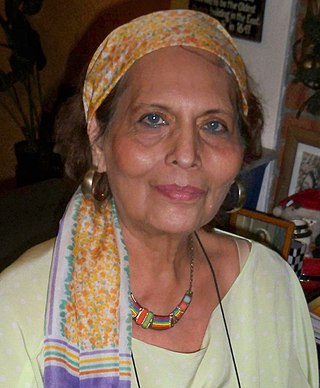Related Research Articles
The Macanese people are an East Asian ethnic group that originated in Macau in the 16th century, consisting of people of predominantly mixed Cantonese and Portuguese as well as Malay, Japanese, English, Dutch, Sinhalese, and Indian ancestry.
Papia Kristang, or just Kristang, is a creole language spoken by the Kristang, a community of people of mixed Portuguese and Malay ancestry, chiefly in Malacca, Malaysia.

Macanese patois, known as patuá to its speakers, is a Portuguese-based creole language with a substrate from Cantonese, Malay and Sinhala, which was originally spoken by the Macanese community of the Portuguese colony of Macau. It is now spoken by a few families in Macau and in the Macanese diaspora.

Manuel Teixeira Gomes, GCSE was a Portuguese politician and writer who served as the seventh president of Portugal between 5 October 1923 and 11 December 1925.

Constituent Assembly elections were carried out in Portugal on 25 April 1975, exactly one year after the Carnation Revolution. The election elected all 250 members of the Portuguese Constituent Assembly.

The Kristang or Serani are a creole ethnic group of people of predominantly mixed Portuguese and Malaccan descent, with substantial Dutch, British, Jewish, Malay, Chinese and Indian heritage. They are based in Malaysia and to some extent in Singapore. People of this ethnicity have, besides Portuguese, a strong Dutch heritage due to intermarriages, which is common among the Kristang. In addition, due to persecution by the Portuguese Inquisition in the region, a lot of the Jews of Malacca assimilated into the Kristang community. The creole group arose in Malacca between the 16th and 17th centuries, when the city was a port and base of the Portuguese Empire. Some descendants speak a distinctive Kristang language or Malacca Portuguese, a creole based on Portuguese. Today the government classifies them as Portuguese Eurasians.

The Diocese of Macau is a Latin Church ecclesiastical territory or diocese of the Catholic Church, in contrast with the Diocese of Hong Kong, which is, de jure, part of the Ecclesiastical Province of Guangdong.

Freixo de Espada à Cinta, sometimes erroneously called Freixo de Espada Cinta, is a municipality in the northeastern region of Portugal, near the border with Spain, along the Douro River Valley. The population in 2011 was 3,780, in an area of 244.14 km2.

João Maria Ferreira do Amaral was a Portuguese military officer and politician. While he was governor of Macau, he was assassinated by several Chinese men, triggering the Battle of Passaleão between Portugal and China.
The corridinho is a form of Portuguese folk dance, namely in the Algarve region. The origin of the dance itself is unclear and believed older, although it gained popularity in the 1800s. The name derives from correr, to run which partly describes this type of dance. The dance was performed in a round in the open air. The oldest musical instruments recorded were small flutes or fifes (pífaro) and harmonicas, (harmónica) until the accordion was implemented and dominated ever since.
Articles related to Macau include:

Vicente Nicolau de Mesquita was an officer of the Portuguese Army in Macau. He is widely remembered for his role at the Portuguese attack of Baishaling, in 1849. He was the oldest of the five children of noted Macanese lawyer, Frederico Albino de Mesquita and Clara Esmeralda Carneiro - both Macau natives. He married twice; first to Balbina Maria da Silveira; second to his sister-in-law Carolina Maria Josefa da Silveira.

The Passaleão incident, also known as the Battle of Passaleão or Baishaling incident, was a conflict between Portugal and China over Macau in August 1849. The Chinese were defeated in the only military confrontation, but the Portuguese called off further punitive measures after a naval explosion killed about 200 sailors.

The Ministry of Science, Technology and Higher Education is a Portuguese government ministry dedicated to the design, development, execution and assessment of the science, technology and higher education national policy. Its official address is the Palácio das Laranjeiras in Lisbon. The rest of the education system falls within the scope of the Ministry of Education. Since March 30, 2022, the current minister is Elvira Fortunato, aided by Pedro Nuno Teixeira as secretary of State of the Higher Education. As all other ministers, the minister of Science, Technology and Higher Education is part of the Council of Ministers.
The Portuguese language is spoken in Asia by small communities either in regions which formerly served as colonies to Portugal, notably Macau and East Timor where the language is official albeit not widely spoken, Lusophone immigrants, notably the Brazilians in Japan or by some Afro-Asians and Luso-Asians. In Larantuka, Indonesia and Daman and Diu, India, Portuguese has a religious connotation, according to Damanese Portuguese-Indian Association, there are 10 – 12,000 Portuguese speakers in the territory.
João da Gama was a Portuguese explorer and colonial administrator in the Far East in the last quarter of the 16th century. He was the grandson of Vasco da Gama. João da Gama sailed from Macau to northeast and rounded Japan by north. He crossed the Pacific Ocean at the northernmost latitudes taken until then by Europeans. Forced by the circumstances of his voyage, he became also a circumnavigator. The lands northeast of Japan which João da Gama discovered were the target of legend and speculation in the centuries that followed, inspiring its search by European powers.

António Joaquim de Medeiros was a Portuguese prelate of the Roman Catholic Church. He was born in Portugal, and ordained in 1871. By the mid-1870s he was working in Macau, and in 1877 he traveled to Portuguese Timor to serve in the Catholic missions there. In 1882, he was appointed Auxiliary Bishop of Goa, and in 1884 he was selected Bishop of Macau. He served in that position until his death in 1897.

Joan Margaret Marbeck, a Malaysian scholar specializing in the study of Malay-Portuguese Creole language Kristang in Malaysia and other countries.
Leonardo Fernandes de Sá, O. Cist. was a Roman Catholic prelate who served as Bishop of Macau (1578–1597).
Isabel Reigota was a Portuguese trader, who was born in Japan, and lived in Macau in the 17th century. She took over her husband's business after being widowed, and played a notable role in establishing Macau's trade in sandalwood, as well as in funding religious missions by Jesuits in Japan and Macau. She was involved in a notable dispute with several Jesuit leaders over a sandalwood transaction in the 1650s, which was ultimately resolved in her favor.
References
- "Manuel Teixeira". Library of Macau (in Portuguese). Retrieved 2020-12-30.